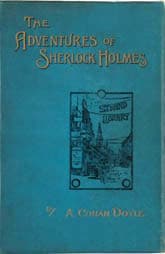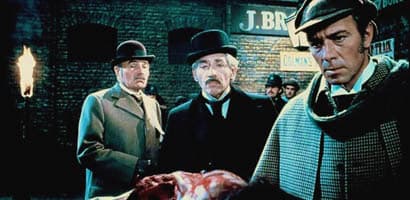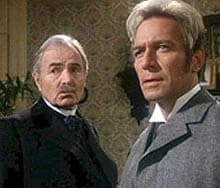The Adventures of Sherlock Holmes
Critique • Quotes • Text • Sherlock Holmes at the movies
 First edition
First editionFirst publication
1892
Literature form
Story collection
Genres
Crime, mystery
Writing language
English
Author's country
England
Length
Twelve stories, approx. 94,000 words

Christopher Plummer's Holmes investigates, aided by Mason's Watson and Finlay's Lestrade.
Holmes warmed up
Murder by Decree (1979): Film, 124 minutes; director Bob Clark; writer John Hopkins; featuring Christopher Plummer, James Mason, Anthony Quayle, John Gielgud, Donald Sutherland, Genevieve Bujold
Canadian actor Christopher Plummer would seem a natural fit for Sherlock Holmes—a classically trained actor with the necessary gravitas, the chiseled profile and a knack for playing cold, cerebral characters with dramatic flair.
What's unexpected in Murder by Decree (1979), as even his co-star James Mason remarked, is the warmth he brings to Holmes. This is especially evident in the detective's relationship with his sidekick.
We can sort all Holmes portrayals by two poles: those that emphasize his sociopathic character and those that turn him into an sociable hero, with some—maybe most—falling somewhere in between. Plummer's is way towards the empathic end of the scale. His Holmes demonstrates his fondness for Watson repeatedly.
And Mason, despite being nearly two decades older than Plummer, responds with one of the most fully realized and human Watsons ever. He practically steals the show with his subtle shifts from anger to pride to petulance. The dinner scene in which he tries to corral the last item on his plate, until Holmes reaches over and takes charge, includes the deathless line that will go down in the annals of Sherlockiana, uttered as only James Mason could utter it: "You squashed my pea!"
Plummer's Holmes also feels for the victims whose murders he investigates, rather than just see them as puzzles to be solved. The victims in Murder by Decree are the prostitutes whose gruesome slayings are attributed to Jack the Ripper. Holmes makes it his mission to save one he expects to be the next target—and he later strives mightily to protect a child of one of the doomed ladies.
His pain over his partial failures is expressed more openly than in any other Sherlock Holmes feature. Not to mention the depth of his outrage when he links the murders to powerful political figures. (You knew by the title this had to be part of the solution, didn't you?)
Where his Sherlock Holmes fails though is in the script. The detective isn't shown using his celebrated rational thinking to unlock the mysteries. Nor along the way do we get much evidence of his famed methods of observation and deduction at all. Instead, he proceeds by a little bit of chemical analysis and much running around in the dank alleys of Whitechapel.
The script by John Hopkins is based on a book, Jack the Ripper: The Final Solution by Stephen Knight, although credit is also given to a book, The Ripper Files, by television writer Elwyn Jones and John Lloyd.
For its time though, it's a decent and welcome take on Sherlock Holmes, given the wild departures from canon of the previous efforts of the 1970s.
And ably backing the leads in this Canadian production are a slew of Britain's most honoured actors, including Anthony Quayle (who had also shone fourteen years earlier in that other Holmes-versus-Ripper flick, A Study in Terror), John Gielgud in too small a role as the Prime Minister, and David Hemmings as Inspector Foxborough. Frank Finlay reprises his role as Inspector Lestrade from A Study in Terror.
Support from Canadian ranks includes Donald Sutherland, looking stoned and otherworldly as a psychic, and Genevieve Bujold, appearing frail and small as a woman with a secret in an insane asylum.
Clip shows Holmes (Plummer) rescuing Annie Crook (Bujold) from a mental institution.
Bujold and Plummer were nominated for the Canada's Genie Awards, along with director Bob Clark.
This is actually Plummer's second portrayal of Holmes. In 1977 he had starred in the Canadian/British television production of Silver Blaze. Then he had played up Holmes as a drug addict. He was teamed with Thorley Waters, who had played Watson several other times including as sidekick to Christopher Lee's and Douglas Wilmer's Holmeses. (It's an incestuous world, Sherlockland.)
Plummer had hoped Silver Blaze would launch a Sherlock Holmes series but fate decreed he'd have only one more spin in the deerstalker cap—in the 1979 movie. Not a bad legacy, actually.
But the greatest of Holmes television series was about to launch elsewhere.
— Eric
Critique • Quotes • Text • Sherlock Holmes at the movies
1922, 1929–1933, 1931–1937, 1939–1946, 1954–1955, 1959–1984, 1962–1992, 1965, 1970, 1975–1988, 1976, 1979, 1982, 1984–1994, 2000–2002, 2002, 2002b, 2009–2011, 2010–2017, 2012–2019, 2015


